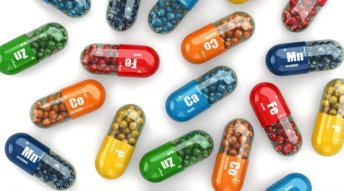Over the years, patients have frequently asked, “what vitamins should I take?” As cancer doctors, our first priority is to cure cancer and help patients understand their prognosis and treatment. But even if less critical, they should still have an answer to the vitamin question. As we looked into it further we just couldn’t find an appropriate answer or product, so we formed the SafeVite Research Team and got to work.
Over the last 4 years our findings have surprised us in that, although there is a tremendous body of evidence and prior studies regarding vitamins and cancer, it just hadn’t been put together in one logical product… until now. SafeVite has been formulated by our Research Team of Cancer Doctors, carefully considering which vitamins to include and in what doses, in an effort to maximize the benefit to patients in and after cancer treatment.
Some of the questions our Research Team has answered in formulating SafeVite:
- There are certain vitamins to avoid during curative treatment
- Treatment can lead to specific long-term vitamin deficiencies
- Cancer patients run the risk of dangerously elevated vitamin levels
- Cancer treatment can lead to long-term toxicities like hair thinning and nerve damage
And these are just a few examples.
We know the answer is not ‘more vitamins are better’ or just buying a multivitamin off the shelf, as they do not address the specific deficiencies, toxicities and conditions caused by cancer and/or cancer treatment as found in our research. The answer is SafeVite and it’s our goal that SafeVite supports your body’s vitamin needs as you continue your fight against cancer.
What does SafeVite contain and why?
Using the most current references and studies, our research team has focused on vitamins that can be safely recommended for all cancer patients.
Examples are:
- D deficiency is widespread and frequently seen in patients receiving cancer treatments including colon and breast cancer patients.
- B6 (pyridoxine) — Likely protects or mitigates the nerve damage by chemotherapeutic agents and possibly targeted agents that are often used to treat lymphoma, breast, colon, lung, sarcoma and myeloma (and other cancers). B6 is associated with lower risk of hormone positive breast cancer and likely helpful in colon and pancreatic cancer.
- B12 is deficient in many types of cancer including breast cancer and multiple myeloma. B12 deficiency often results from deficiency of the protein intrinsic factor produced by the parietal cell in the stomach and thus frequently present in cancer patients and likely requires a very high dose in order to be absorbed by passive diffusion. B12 based on homocysteine alterations likely mitigates bone turnover and bone fracture risk.
What does SafeVite avoid and why?
Based on the most credible research available, SafeVite’s Cancer specialists have concluded that it is appropriate to avoid some vitamins from use in order to maximize your body’s fight against Cancer.
- Calcium – One out of every four cancer patients will have significantly elevated calcium levels at some time in their life. Although calcium may be necessary for certain patients (like those on bone strengthening agents) it is best to avoid added calcium until confirmed with your doctor what amounts are appropriate.
- Zinc – Though Zinc can specifically help with taste alterations due to radiation damage in oral cavity; it could mitigate the curative effects of this treatment. This is currently still being studied. For now likely best to avoid since its known benefits are limited to this specific situation and it definitely leads to copper deficiency.
- E & A – Vitamins E and A, beta-carotene and selenium definitely interfere with potentially curative chemotherapy and radiation treatments while surprisingly seem to not be helpful in cancer prevention or possibly harmful in the development of cancers like lung cancer or prostate cancer.

